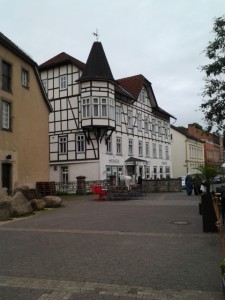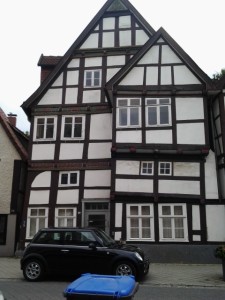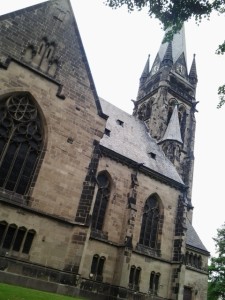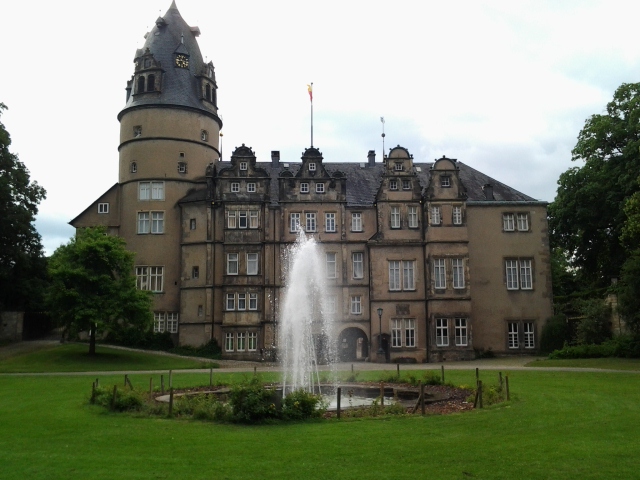Well, here I am. In Germany again. The overriding thought for this trip is not the awesome opportunity to be in Europe, to see wonderful cities, meet amazingly friendly people, or finally be able to get into the “meat and potatoes” of this darn dissertation. No, I’m much more practical than that. My overriding thought, is… I sure miss my family. How can I be away for a whole month? My baby girl won’t even remember me, will she? Think about that next time you think going off to Europe to do research sounds so cool.

That’s the reality of the situation. Now on to the academic and other sides of things. The first stop on my research trip is Detmold. It is a very pretty city, so I’ll intersperse this post with pictures. Here I will be looking for anything in any way related to the tunnels at Porta Westfalica. I’m staying at the Hotel Nadler, a quaint little Fachwerkhaus turned into a restaurant and hotel. It’s right on the outskirts of the city center, where all the action is. I picked this location for it’s closeness to the city center and because it’s not too far from the archive. Just a 10-15 minute walk. I have done that for all of the locations except Berlin. That makes me walk so I get some exercise before and after sitting at a desk looking at old papers all day.
I got to the city too late to get to the archives the first day, so I went the second day I was there. And the two following days there after. That was Wednesday, Thursday and Friday. The first day made the trip seem a bit worthless. Of the fifteen or so folders of material that I had to go through, I got through about seven of them on Wednesday, and there was nothing worth wile in them, at least not for me. I did almost want to change my topic to something about how to prepare your house or building for bombing raids. There were some cool brochures and books on that. I later saw a portion of a documentary on TV that showed some training videos on what to when bombed by the British fire bombs. That seems like it could be a good research project; focusing on the literature and other forms of educating the populace on how to survive bombing raids. Anyhow, I digress.

On Thursday and Friday I hit the proverbial jackpot. Not for documents relating to the building and use of the tunnels during the war, but what was done with it afterwards. Most of the works out there all close their research with liberation by the US or British. I want to write about what happened after that. How did the people in the area deal with all of those former prisoners? Where did the former prisoners go? What did they do with these huge holes in their mountains? What happened with the equipment? Who was punished?
What I found in the archive were loads of documents that dealt with this post-war period. Unfortunately the archive follows the arcane tradition of not allowing users to maker their own copies of their documents. If I had a whole month, or $1000, I could have got all of the information. But I will have to be satisfied with what I could transcribe into my computer. One folder was full of tabulations of the weekly hours worked in the tunnel site in dismantling hardware and machinery, and preparing the site for demolition. Another folder was full of correspondence to those in charge of the post-war tunnel and the companies and firms that had contracts for building during the war. They apparently felt they should still be paid for work done. That’s something I had never considered before. Companies that contracted with the National Socialist Government to build and design, were promised money. When the war was lost, the National Socialist Government dissolved. Well, did that dissolve the contracts as well? Were the companies to lose out on the money owed them? I’m not sure what the answer on that one is. But I found a bunch of complaints and claims from building companies and architecture firms that wanted payment from somebody.

One final thing that I found in Detmold, was the correspondence between the town of Hausberge and the occupying British Army. The British plan was to blow up the whole of the tunnel system due to the possibility of the location being a highly usable military compound. The Allied Occupying forces want to completely wipe out any German military compounds.
My time in Detmold was a bit too short, but I may be able to swing a day on the way back if all goes quickly in Berlin. But I doubt I’ll ever be back, unless some other generous organization would like to pay for another research trip.
